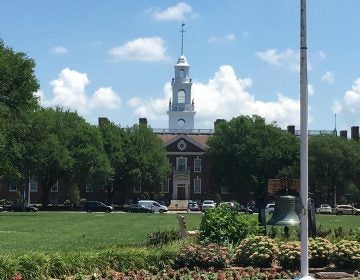Delaware approves $4.45 billion budget to better support education for low-income kids
The Delaware General Assembly approved Gov. John Carney’s $4.45 billion operating budget that includes new spending on education, social services and state workers.

Gov. John Carney signed Delaware’s $4.45 billion budget Tuesday afternoon in his Dover office. (Courtesy of Carney staff)
The Delaware General Assembly approved Gov. John Carney’s $4.45 billion operating budget that includes new spending on education, social services and state workers.
After a unanimous vote in the House last week, the Senate followed suit Tuesday. This is the second consecutive year Delaware lawmakers have approved the budget before the June 30 deadline.
Traditionally, the legislators work on the budget bill into the wee hours of July 1. In 2017, squabbles over spending cuts and proposed tax increases prevented the budget from being signed until July 3 — the latest date in recent history.
The operating budget for fiscal 2020 represents a 4.2% increase over the current year and is even higher than Carney proposed, following an increase of projected revenue.
State Sen. Harris McDowell said the budget represents one of the “best years of cooperation” between the governor’s staff and legislators.
“We went a little over the governor’s target, but we were in conversation with the governor all along,” said McDowell, vice chair of the Joint Finance Committee said. “He wanted us to hold the 3.9% growth but, because we had a lot of work to do, we’re at 4.25% growth. I still think that’s a reasonable figure, well under the growth of revenue we’ve achieved this year.”
In addition to the operating budget, the General Assembly approved a supplemental spending bill appropriating an additional $62 million for one-time operating expenditures. The bill includes dollars for Carney’s “Opportunity Fund”— an education initiative to direct money to schools with low-income students and English language learners to improve reading and math proficiency.
The state will spend $75 million on that initiative over a three year period, which is $15 million more than originally proposed by Carney.
“We’ve put $500,000 in the epilogue in the budget to hire what we hope will be the top consulting firm in the country that will see this opportunity as being able to smash the failure mechanism we’ve allowed to grow in our schools over the years,” McDowell said.
The budget also helps pay for increased school positions, wellness centers in Wilmington’s schools and a 2% pay raise for public school educators.
Other funding to support children includes $3.2 million for the Children’s Health Insurance Program to replace decreased federal funding, about $4 million for day care for low-income children, and about $3 million to hire new child abuse and neglect investigators.
The budget also includes a $1,000 raise for state workers and spending on college scholarships and student loan forgiveness.
For the second year in a row, legislators took advantage of improving revenue forecasts to set aside millions of dollars in reserve for years when the state’s revenue is struggling.
“This budget grows more than I like, but with the amount of money that has come into the system in the last couple year, the discipline you guys have shown…” said state Sen. Colin Bonini, R-Dover. “Changing that culture to set that money aside for future needs, which are going to come, I think that’s fantastic. All 62 of us have things we want to spend money on, me too. To create that culture where we’re able to work through that, I’m tremendously thankful.”
While the operating budget is behind them, lawmakers will still have to address the $678.6 million capital budget for transportation and construction projects before the fiscal year starts on July 1. Passage of that bill was delayed last year, however, through a marathon overnight session. It was finally approved at 8 a.m. on July 1.
WHYY is your source for fact-based, in-depth journalism and information. As a nonprofit organization, we rely on financial support from readers like you. Please give today.




